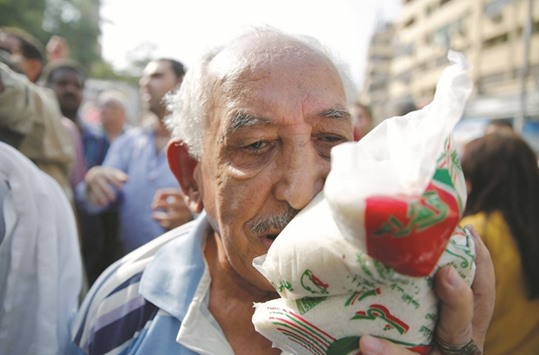Laila El-Sayed spent her afternoon searching grocery stores in Cairo’s bustling Dokki district on the banks of the Nile River for one thing: sugar.
She managed to find two bags in a state-owned shop for 10 Egyptian pounds ($1.13) per 1-kilogram bag, twice what she paid in August. In other parts of Cairo, shoppers stand in long lines as supermarkets limit customers to one or two bags of sugar.
“I drink tea an average of five times a day with two spoonfuls of sugar. My husband drinks it with three spoons,” she said. “Now we have to cut even the tea we drink?”
After six years of unrest, terrorist attacks and a collapse in the tourism industry, Egypt’s economy has been crippled by spiralling inflation and a shortage of foreign currency, making it tougher to import basic commodities. At the same time, sugar prices globally are on the rise because of supply problems in Asia and a smaller than expected crop in Brazil, the world’s biggest producer.
The shortage is being especially felt in Egypt, where tea with heaps of sugar is one of the most popular beverages in street cafes. At one shop in Dokki, a cost of a cup of tea has risen 14% to 4 pounds, said Ahmed Ali, who works at the cafe.
Egypt consumes about 3mn metric tonnes of sugar annually, but produces just over 2mn tonnes, according to data from the US Department of Agriculture. It expects the country to import 830,000 tonnes in 2016-17.
“Importers are forced to buy dollars from the black market, so traders have one of two options – either factor in the dollar in the final price or give up the commodity altogether,” said Mohamed Hamza, a senior researcher at the USDA office in Cairo.
“This is applicable to all imports, not just sugar, but because sugar is such a sensitive commodity, people can now feel it,’’ he said.
A UN index of global retail sugar prices has risen 47% this year, on track for the biggest annual increase since 2009. In the Bloomberg Commodity Index, sugar futures have risen more than any other raw material this year.
To alleviate the crisis, Egypt’s state-owned trading arm announced plans to buy sugar and the government has promised to create stockpiles that would last six months. The General Authority for Supply Commodities bought 134,000 tonnes of sugar in an October 15 tender and the country has contracts to import 450,000 tonnes. The supply ministry said yesterday the government plans to pump 50,000 tonnes of sugar into the market at 5 Egyptian pounds per kilogram for subsidised card holders and 7 pounds per kilogram for industry.
The sugar scarcity is a symptom of Egypt’s broader economic turmoil. Since a popular uprising in 2011 against former president Hosni Mubarak, the country burned through billions of foreign currency reserves as political unrest drove away tourists and foreign investors.
The Egyptian pound recently slumped to a record low 15.58 per dollar in the black market – compared to the official rate of 8.88.
As a result, it’s difficult for importers to source dollars needed to pay for shipments.
Nile Sugar Co, which operates a sugar refinery about 50km (31 miles) from the Port of Alexandria, didn’t import any sugar this year because of the dollar shortage, according to Tamer Ismail, the head of the commercial department. The company usually imports between 100,000 tonnes and 200,000 tonnes a year of raw sugar, he said.
“We have the facilities, we have the refinery but because of the dollar unavailability and the rise in global prices, we couldn’t import,’’ Ismail said.

A man carries subsidised sugar after buying it from a government truck during a sugar shortage in retail stores across the country in Cairo on Friday. After six years of unrest, terrorist attacks and a collapse in the tourism industry, Egypt’s economy has been crippled by spiralling inflation and a shortage of foreign currency, making it tougher to import basic commodities.


